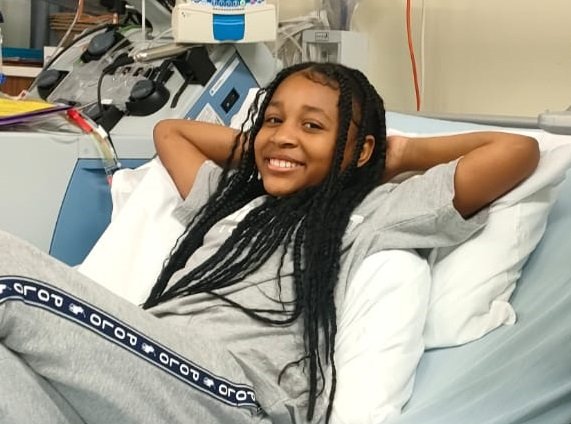Teenage sickle cell patient able to play sport after rare procedure
A South London hospital has started using a rare technique to treat children with sickle cell disease.
Neriya-May Hall, 13, from Croydon, is one of the sickle cell disease patients at St George’s Hospital in Tooting to have their lives transformed by the use of ultrasound to administer blood transfusions.
Michaela Mayhew, a haematology nurse at St George’s, said: “Using ultrasound in this way is rare, and seeing patients like Neriya live their lives as a result makes me very proud.
“Things have changed a lot, in terms of how we treat people with sickle cell disease, and the younger generation – like Neriya – show what can be done.”

People with sickle cell disease produce unusually-shaped red blood cells, and need a blood transfusion to replaces those cells with donor blood.
Neriya-May needs this treatment every four to five weeks and has been receiving care at St George’s for about five years.
Medics at St George’s now use an ultrasound machine to find a suitable vein before the patient undergoes an automated red blood cell exchange. This reduces the number of sickle cell crises experienced by people with the disorder and cuts the amount of time spent in hospital.
Neriya-May can now play sports and enjoy days out knowing she is much less likely to experience a sickle cell crisis – episodes of pain that happen when blood vessels become blocked.

Speaking from one of the hospital’s children’s wards during the treatment, Neriya-May said: “They help me to stay well, and not get sick. Everyone is so nice and supportive, and we know a lot of people here now.”
The teenager said she has even spoken to other children who are about to start the same treatment to reassure them it will be OK.
She said: “I said it’s better. It might hurt for five minutes, but then it’s calm.
“It’s better this way, because you get it done, and you know you’re good for another five weeks.”
Blood tests predict how often someone needs the procedure, meaning Neriya-May can also plan holidays and trips away and recently visited Morocco with her family.

Neriya-May’s dad, Leon Hall, said: “Before this, we had to fly back from holiday because Neriya had a crisis and she was in so much pain, which was horrible to see.
“But all of that has gone away now. We feel confident when she has this treatment that we can go away.
“We’ve noticed such a difference, she’s amazing, and just takes it all in her stride.”
Sickle cell disease is a lifelong condition that is particularly common in people with an African or Caribbean family background.
It’s caused by a gene that affects how red blood cells develop. If both parents have the gene, there is a one in four chance of each child they have being born with sickle cell.
Kate Slemeck, managing director for St George’s University Hospital Trust, said: “Neriya’s story demonstrates how such advancements are making a difference to quality of life and experience.
“We couldn’t do it without the support of all the amazing blood donors out there.”
NHS Blood and Transplant needs 12,000 extra donors of Black heritage, and 250 donations, every day, to help meet the demand for patients with sickle cell. To find out more, visit: www.blood.co.uk
Pictured top: Neriya-May with her football trophies (Picture: Leon Hall)
